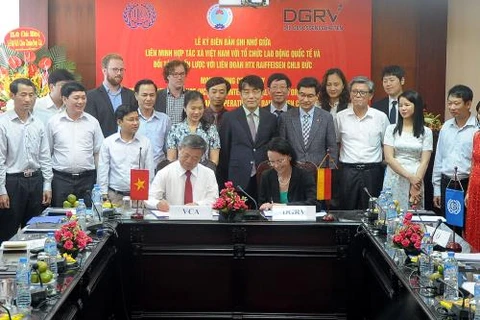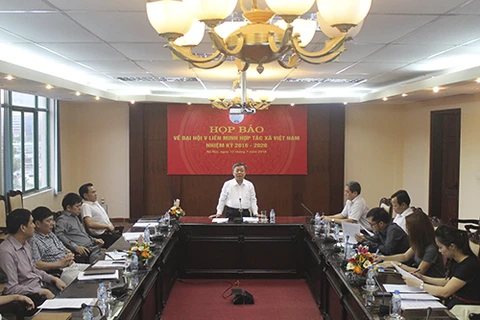 President of the Vietnam Fatherland Front (VFF) Central Committee Nguyen Thien Nhan speaks at the congress (Source: VNA)
President of the Vietnam Fatherland Front (VFF) Central Committee Nguyen Thien Nhan speaks at the congress (Source: VNA) Hanoi (VNA) - It is necessary to reorganise the cooperative sector through gathering individual producers in cooperatives and cooperative groups in the time ahead, said President of the Vietnam Fatherland Front (VFF) Central Committee Nguyen Thien Nhan.
At the 5th Congress of the Vietnam Cooperative Alliance (VCA) in Hanoi on July 19, the VFF leader stressed the need to roll out measures to make Vietnam’s cooperative economy develop in line with the general trend of humankind.
He asked the VCA to arrange more campaigns nationwide to spread information on the 2012 Law on Cooperatives and the role played by new-style cooperatives towards improving the efficiency of individual production and business units and seeking markets for cooperatives’ members.
Outstanding models of new-style cooperatives in agriculture, transport and handicraft should be introduced to farmers, so they are active in forming new-style cooperatives and cooperative groups owned by themselves, he stressed.
Additionally, special attention must be paid to training people who are or will be leaders of cooperatives in the future, he said, adding that it is necessary to solve difficulties concerning goods consumption, technology development and land facing cooperatives now.
According to VCA Vice Chairman Nguyen Dac Thang, a total of 5,000 cooperatives and 150,000 cooperative groups were set up over the last five years, contributing about 5 percent to the national GDP. The sector recorded a 3 percent growth between 2012-2014.
Some new-style cooperative models, which have a connection to goods value chains have been taking shape in the period; while many cooperatives have expanded production and business, promoted technological application and enhanced links with other economic sectors.
However, he also pointed out limitations in enforcing the 2012 Law on Cooperatives 2012, saying that the issuance of documents guiding the enforcement of the law and the State’s support policies for cooperatives remained slow and unsystematic.
The state management for the cooperative economy from central to local levels was not consistent, he noted, adding that the role and position played by the VCA has yet to meet requirements, in the context of fostering integration.
VCA Chairman Vo Kim Cu stated that the alliance will focus on developing new-style cooperatives in connection with building value chains of goods and prioritising the development of public service cooperatives and those specialising in producing materials, preserving, processing and selling products for their members.
It is set to increase the number of cooperative groups to 250,000 by 2020, with 5 percent of the total being developed into full cooperatives. The average income of cooperative members and labourers is expected to double the 2015 figure, he said.
The congress elected a 142-strong executive board for the 2016-2020 tenure, led by Vo Kim Cu.-VNA























